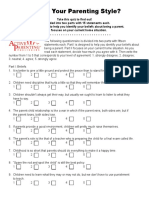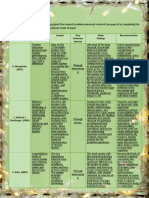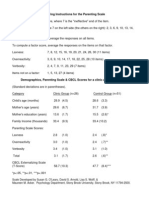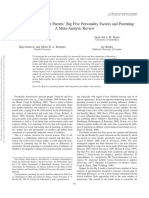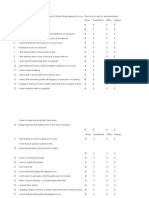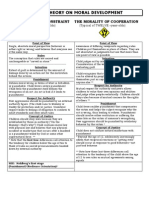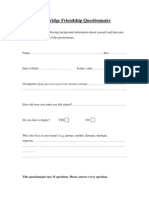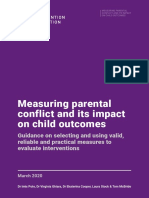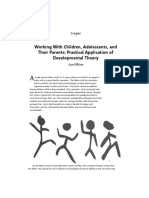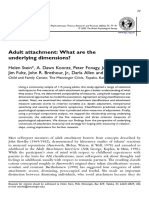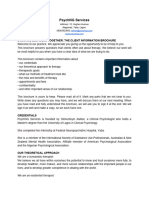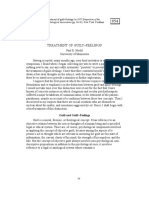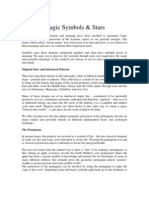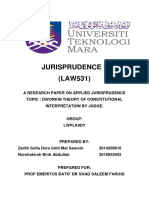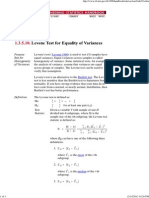Chestionar Parenting-Style-Assessment PDF
Chestionar Parenting-Style-Assessment PDF
Uploaded by
Elena RaduCopyright:
Available Formats
Chestionar Parenting-Style-Assessment PDF
Chestionar Parenting-Style-Assessment PDF
Uploaded by
Elena RaduOriginal Title
Copyright
Available Formats
Share this document
Did you find this document useful?
Is this content inappropriate?
Copyright:
Available Formats
Chestionar Parenting-Style-Assessment PDF
Chestionar Parenting-Style-Assessment PDF
Uploaded by
Elena RaduCopyright:
Available Formats
What is Your Parenting Style?
How would you describe your approach to parenting? From each of the
following groups of statements, check the one that best describes you:
Group 1
❑❑ 1. I believe children should be seen and not heard.
❑❑ 2. I enjoy the chaos of parenting.
❑❑ 3. I believe children can be children and also practice civility.
❑❑ 4. My children keep to themselves and don’t bother me much.
Group 2
❑❑ 1. I think my children need a firm hand to direct them so they
behave properly.
❑❑ 2. I believe my children need freedom to learn who they are.
❑❑ 3. I love watching my children discover things for themselves –
and I am there if they have questions.
❑❑ 4. My children learn how to behave in school or at child care.
Group 3
❑❑ 1. I don’t have a problem saying “no” to my child.
❑❑ 2. I hate saying “no” to my child.
❑❑ 3. Sometime I need to say “no” to my child, and sometimes I
say “yes.”
❑❑ 4. Mostly I just ignore my child’s bad behavior.
Group 4
❑❑ 1. Every rule – big and little – must be followed.
❑❑ 2. I don’t believe in lots of rules – when I am with my children I
want to enjoy them and have fun, not be a disciplinarian.
❑❑ 3. I have rules that are really important, and I expect them to be
followed. But I am willing to be flexible about smaller issues.
❑❑ 4. Having lots of rules is too complicated – sometimes it’s just
easier to ignore some behavior.
Parents Forever Online Course for Parents 1
Group 5
❑❑ 1. I think discipline is correcting your children when they misbehave.
❑❑ 2. I don’t believe in lots of discipline – my children need freedom.
❑❑ 3. I think discipline is an opportunity to teach your children.
❑❑ 4. The other parent takes care of most of the discipline.
Group 6
❑❑ 1. I am okay if my children are unhappy with me.
❑❑ 2. I want my children to like me.
❑❑ 3. Sometimes I need to be unpopular with my children to keep
them safe and ensure they do what needs to be done.
❑❑ 4. I am not sure how to get my children to like me.
Group 7
❑❑ 1. Children must respect their parents
❑❑ 2. I like it when my child is respectful, but I must admit, that’s not
often. Must be the age.
❑❑ 3. Parents need to model the respect they expect from their child.
❑❑ 4. I wish my child was more respectful, but since she’s not, I try to
ignore it.
Group 8
❑❑ 1. I know exactly what my children are doing, who they are with
and where they are all the time.
❑❑ 2. I try to keep up with my children’s comings and goings, but
sometimes they won’t tell me.
❑❑ 3. My children and I have an agreement – I will always let them
know where I am and they will do the same for me.
❑❑ 4. I don’t keep track of what my children are up to – they seem fine
and have teachers and child care providers to watch over them.
2 What is Your Parenting Style?
Group 9
❑❑ 1. I don’t tolerate mistakes – I can see making a mistake once, but
after that children need to be punished.
❑❑ 2. I think that if children don’t feel successful, they will not have
the confidence to do well in life.
❑❑ 3. Some of the greatest lessons for children come from their
mistakes. I try to help my children learn from their mistakes.
❑❑ 4. Everyone makes mistakes – I don’t get real upset over my
children’s mistakes. They will figure it out.
Group 10
❑❑ 1. I don’t believe parents should be their children’s friend – you will
lose your authority over them.
❑❑ 2. My children are my best friends.
❑❑ 3. My children are friends with other children; I need to be
their parent.
❑❑ 4. I really don’t understand how parents and children could be
friends – we are so different from each other.
Group 11
❑❑ 1. I don’t tell my children much – these are adult matters.
❑❑ 2. I can tell my child just about anything.
❑❑ 3. I let my children know what is going on, especially if it affects
them, but some things I need to talk with another adult about.
❑❑ 4. My children don’t need much information; they seem to be
doing fine.
Parents Forever Online Course for Parents 3
So what is your parenting style?
Scoring:
Add up the number of times you responded to a question with a 1, 2, 3 or
4 and put that number in the box under “Number of Times” to the right of
the appropriate response number. Look at the response number where you
have the highest number of times; this is your predominant approach to
parenting, or parenting style.
Number Parenting Style Description
of Times
1 Dominating You are firm believer in rules and have high
expectations for behavior. You show your love by
expecting the best from your children, but rarely
show affection. Communication is generally one
way – from you to your child. Sometimes you can
be rigid and harsh in correcting bad behavior.
2 Permissive You show your children lots of love, give them
what they ask for, communicate openly and let
them do what they want most of the time. You
have trouble setting and enforcing rules. You
prefer to be friendly rather than a disciplinarian.
Sometimes you feel like your children walk
all over you.
3 Positive You believe children need your love, but you
also have high expectations and believe your
children need rules and guidance in order to
meet these expectations. You view parenting
as your most important job, and serve as a role
model for your children by modeling the respect
you expect from them. You believe in listening
to your children, but when it comes down to it,
you have the final say regarding issues involving
safety, values and health. Your children know
what you expect and they know you will be
consistent, fair and firm.
4 Unengaged You may feel uncomfortable about parenting
because you don’t spend much time with your
children. You may focus more on work or other
interests. When you are with your children, you
often are preoccupied and not focused on them.
You assume the other parent is doing a pretty
good job. You aren’t sure what you can do that
would be helpful anyway.
Source:
Pitzer, R. (2001). What is your parenting style? A parenting styles self-
assessment. St. Paul, MN: University of Minnesota Extension.
4 What is Your Parenting Style?
You might also like
- Parenting Style Quiz-Printable PDFDocument4 pagesParenting Style Quiz-Printable PDFYvan Paez0% (1)
- Parental Bonding Instrument: Gordon Parker, Hilary Tupling and L. BDocument10 pagesParental Bonding Instrument: Gordon Parker, Hilary Tupling and L. BSindria MelaniNo ratings yet
- 25 Things All Great Communicators DoDocument3 pages25 Things All Great Communicators Doapi-561982212No ratings yet
- 6 Pillars of CharacterDocument1 page6 Pillars of Characterapi-249413578100% (2)
- Parenting StyleDocument3 pagesParenting StyleBen FentyNo ratings yet
- Real Parenting for Real Kids: Enabling parents to bring out the best in their childrenFrom EverandReal Parenting for Real Kids: Enabling parents to bring out the best in their childrenNo ratings yet
- Attachment and NeuroscienceDocument20 pagesAttachment and NeurosciencemochjodhyNo ratings yet
- Parental Bonding InstrumentjDocument4 pagesParental Bonding InstrumentjJason WiseNo ratings yet
- Parenting Through ChangeDocument6 pagesParenting Through ChangeRafael SanchezNo ratings yet
- Parenting Scale Revised PDFDocument4 pagesParenting Scale Revised PDFFranciscoNo ratings yet
- Positive and Negative Reinforcement Handout 1Document1 pagePositive and Negative Reinforcement Handout 1Ивона Шујак100% (1)
- Barber 1996Document31 pagesBarber 1996MorganNo ratings yet
- Parental/Child Attachment - Child SurveyDocument4 pagesParental/Child Attachment - Child SurveyhopeIshanzaNo ratings yet
- What's More: Author/s & Yr. Topic Sample Data Collection Method Major Findings RecommendationDocument2 pagesWhat's More: Author/s & Yr. Topic Sample Data Collection Method Major Findings RecommendationJoyce Bucio Abutan100% (1)
- Reynolds Bully Victimization Scales For SchoolsDocument14 pagesReynolds Bully Victimization Scales For Schoolsapi-246204530100% (1)
- Parenting Scale ScoringDocument1 pageParenting Scale ScoringspctinNo ratings yet
- The Relations Between Parents' Big Five Personality Factors and Parenting-Meta AnalysisDocument12 pagesThe Relations Between Parents' Big Five Personality Factors and Parenting-Meta AnalysisMichelle PajueloNo ratings yet
- Separation Anxiety Disorder and School PhobiaDocument16 pagesSeparation Anxiety Disorder and School Phobiawilkerson4No ratings yet
- Parenting Style InventoryDocument8 pagesParenting Style Inventoryvinsynth100% (1)
- Psychogenic Vomiting Case Report 2019Document8 pagesPsychogenic Vomiting Case Report 2019Roy HallakNo ratings yet
- Morty's Feelings Bingo PDFDocument3 pagesMorty's Feelings Bingo PDFNEW101No ratings yet
- Children Depression and Anxiety ScaleDocument6 pagesChildren Depression and Anxiety Scalezain tahirNo ratings yet
- Evidence Base Update For Parenting Stress Measures in Clinical SamplesDocument22 pagesEvidence Base Update For Parenting Stress Measures in Clinical SamplesCorina NichiforNo ratings yet
- (Ch. 3) Coaching Toddlers' Social and Emotional Competence - Incredible Toddlers (Webster-Stratton)Document48 pages(Ch. 3) Coaching Toddlers' Social and Emotional Competence - Incredible Toddlers (Webster-Stratton)ppeixinhoNo ratings yet
- Revised Children's Anxiety and Depression Scale (And Subscales) (Rcads)Document6 pagesRevised Children's Anxiety and Depression Scale (And Subscales) (Rcads)e_nov78No ratings yet
- Vanderbilt ADHD Diagnostic Parent Scoring & InstructionsDocument3 pagesVanderbilt ADHD Diagnostic Parent Scoring & InstructionsPsiholog Alina Mirela CraiuNo ratings yet
- Questionnaire Set FomoDocument9 pagesQuestionnaire Set FomoainakmliaNo ratings yet
- Effects of Parenting Style On Children DevelopmentDocument23 pagesEffects of Parenting Style On Children DevelopmentCASSANDRA ELEANOR CLEPROS (RCB20701012)No ratings yet
- Conduct DisorderDocument64 pagesConduct DisorderCindtaya ArTaya ExamiNo ratings yet
- Piaget's Theory On Moral DevelopmentDocument1 pagePiaget's Theory On Moral DevelopmentmilkaddictNo ratings yet
- Angermanagement 120801162122 Phpapp01Document132 pagesAngermanagement 120801162122 Phpapp01Muhammad Noor50% (2)
- FQ - Friendship QuestionnaireDocument8 pagesFQ - Friendship QuestionnaireAlex-stim LeonNo ratings yet
- Síntesis y Puntajes Parental Bonding Instrument (PBI)Document5 pagesSíntesis y Puntajes Parental Bonding Instrument (PBI)Darío Osorio CáceresNo ratings yet
- Measuring Parental Conflict ReportDocument120 pagesMeasuring Parental Conflict ReportPhượng HiềnNo ratings yet
- Measure of Parental StyleDocument2 pagesMeasure of Parental StyleGianina TudosăNo ratings yet
- Functional Emotional Growth Chart Parent (Caregiver) QuestionnaireDocument4 pagesFunctional Emotional Growth Chart Parent (Caregiver) QuestionnaireFernanda CorreiaNo ratings yet
- Clinical Report Psychological MaltreatmentDocument10 pagesClinical Report Psychological Maltreatmentapi-341212290No ratings yet
- The Inventory of Parent and Peer Attachment Indivi PDFDocument17 pagesThe Inventory of Parent and Peer Attachment Indivi PDFKhoirul LatifNo ratings yet
- The Rorschach Psychodiagnostic TestDocument32 pagesThe Rorschach Psychodiagnostic TestAyesha NawazNo ratings yet
- Parental Meta Emotion Philosophy and The Emotional Life of Families Theoretical Models and Preliminary DataDocument62 pagesParental Meta Emotion Philosophy and The Emotional Life of Families Theoretical Models and Preliminary DataJoão PauloNo ratings yet
- Understanding and Teaching Friendship Skills Tony Attwood and Carol GrayDocument5 pagesUnderstanding and Teaching Friendship Skills Tony Attwood and Carol GrayklcrosherNo ratings yet
- Projective Techniques ChapterDocument24 pagesProjective Techniques ChapterHeena ShethNo ratings yet
- A Study On Hope, Stress and Self Efficacy in Parents of Children With Intellectual DisabilityDocument9 pagesA Study On Hope, Stress and Self Efficacy in Parents of Children With Intellectual DisabilityZaufyVerliezaNo ratings yet
- Roadmap 2 Evidence Based Social Emotional Curricula and Intervention Packages For Children 0 5 Years and Their Families PDFDocument21 pagesRoadmap 2 Evidence Based Social Emotional Curricula and Intervention Packages For Children 0 5 Years and Their Families PDFShanpaulNo ratings yet
- How To Distinguish ADHD From Typical Toddler BehaviorDocument24 pagesHow To Distinguish ADHD From Typical Toddler BehaviorMike Whitenton100% (1)
- Empathy Lesson Plan ExampleDocument3 pagesEmpathy Lesson Plan ExampleEuresha JeremiahNo ratings yet
- AnnDocument216 pagesAnnsenet senetNo ratings yet
- Childrens Expos To ViolenceDocument110 pagesChildrens Expos To ViolenceNatalia SandicNo ratings yet
- RcmasDocument9 pagesRcmasapi-507192289100% (1)
- Smetana 2017 CurrentResearchDocument7 pagesSmetana 2017 CurrentResearchJovanka JovinNo ratings yet
- Differentiating Psychopathy From Antisocial Personality Disorder: A Triarchic Model PerspectiveDocument9 pagesDifferentiating Psychopathy From Antisocial Personality Disorder: A Triarchic Model PerspectiveNaresh SharmaNo ratings yet
- Observation Checklist What To Look For in Assessing Attachment and BondingDocument3 pagesObservation Checklist What To Look For in Assessing Attachment and BondingMARIO ROBERTO CORDOBA CANDIA100% (1)
- LessonplanDocument4 pagesLessonplanapi-383585295No ratings yet
- Fonagy Et Al-2001-Adult Atachment What Are The Underlying Dimenssions PDFDocument15 pagesFonagy Et Al-2001-Adult Atachment What Are The Underlying Dimenssions PDFJuan Guillermo Manrique LopezNo ratings yet
- Client Therapy BrochureDocument11 pagesClient Therapy BrochureBolaji EsanNo ratings yet
- Positive ParentingDocument15 pagesPositive ParentingSharonSkinnerNo ratings yet
- Meehl - Treatment of Guilty FeelingsDocument8 pagesMeehl - Treatment of Guilty FeelingsDrNihilismNo ratings yet
- STC Report HardDocument6 pagesSTC Report HardMarianne Jubille CataquisNo ratings yet
- The Next ClickDocument24 pagesThe Next ClickjulianandradecunhaNo ratings yet
- Ethical Practice in Psychology: Reflections from the creators of the APS Code of EthicsFrom EverandEthical Practice in Psychology: Reflections from the creators of the APS Code of EthicsNo ratings yet
- Introduction To Improvisation Using Ostinato PatternsDocument1 pageIntroduction To Improvisation Using Ostinato Patternsapi-188751688No ratings yet
- MELC 9 Introduction To The Philosophy of The Human Person Activity Sheet 2 2Document8 pagesMELC 9 Introduction To The Philosophy of The Human Person Activity Sheet 2 2Ronalis PowellNo ratings yet
- Sermon On The Choice of Food - Zwingli (1522)Document24 pagesSermon On The Choice of Food - Zwingli (1522)Jim West100% (2)
- Module 4 Confucianism PDFDocument3 pagesModule 4 Confucianism PDFJeco Valdez0% (1)
- Liberal Education Answer KeyDocument1 pageLiberal Education Answer KeyEm-Em Alonsagay DollosaNo ratings yet
- Uwa 5e Lesson Plan SandDocument3 pagesUwa 5e Lesson Plan Sandapi-400369158No ratings yet
- Seeking Help From Bhagavad-GitaDocument14 pagesSeeking Help From Bhagavad-GitaAbhayNo ratings yet
- Microsoft Word - The Theory of Rasa or Indian Perspectives On CommunicationDocument12 pagesMicrosoft Word - The Theory of Rasa or Indian Perspectives On CommunicationSargam RanaNo ratings yet
- UD105 - PDF Full IssueDocument50 pagesUD105 - PDF Full IssueParul VyasNo ratings yet
- Magic Symbols and StarsDocument4 pagesMagic Symbols and StarsSaravana Kumar100% (1)
- Manual of New Yoga by Peter Wilberg PDFDocument229 pagesManual of New Yoga by Peter Wilberg PDFMethavi100% (1)
- Gann Lines and Angles (Robert Pardo, 1997, Technical Analysis Inc.)Document16 pagesGann Lines and Angles (Robert Pardo, 1997, Technical Analysis Inc.)mehmetonb100% (2)
- ReflectionDocument1 pageReflectionJmar AriemNo ratings yet
- 9.29.2018 CrimDocument3 pages9.29.2018 CrimLio de LeonNo ratings yet
- Geography Lesson PlanDocument2 pagesGeography Lesson Planapi-240361357No ratings yet
- Dan Lind v. Schenley Industries Inc, 278 F.2d 79, 3rd Cir. (1960)Document16 pagesDan Lind v. Schenley Industries Inc, 278 F.2d 79, 3rd Cir. (1960)Scribd Government DocsNo ratings yet
- The Development of Rhythmic Organization in Indian Classical MusicDocument46 pagesThe Development of Rhythmic Organization in Indian Classical MusicJez Humble100% (9)
- Number of Parts and Operators For A Gage R&R Study - MinitabDocument12 pagesNumber of Parts and Operators For A Gage R&R Study - Minitabtehky63No ratings yet
- Final Interview ScheduleDocument2 pagesFinal Interview ScheduleSai Sumanth KNo ratings yet
- 2 Stage Rocket ExerciseDocument4 pages2 Stage Rocket Exercisemartim_martinsNo ratings yet
- Dworkin AssignmentDocument8 pagesDworkin AssignmentkeiraNo ratings yet
- Bol Rev TroubledEmpire BrookDocument5 pagesBol Rev TroubledEmpire BrookDewa AsmaraNo ratings yet
- Ahmed - 1990 - Being in TroubleDocument11 pagesAhmed - 1990 - Being in TroublePablo Pérez Navarro100% (1)
- "Context" in ContextDocument19 pages"Context" in ContextChem R. PantorillaNo ratings yet
- 09chapter 3 PDFDocument35 pages09chapter 3 PDFDaniel DiaNo ratings yet
- Purpose: Test For Homogeneity of Variances: Levene 1960Document3 pagesPurpose: Test For Homogeneity of Variances: Levene 19603rlangNo ratings yet
- Sultans Wives PortfolioDocument3 pagesSultans Wives Portfolioapi-219303558No ratings yet
- Richard Schechner - A Ritual Seminar TranscribedDocument11 pagesRichard Schechner - A Ritual Seminar TranscribedAlice PickettNo ratings yet
- Syllabus Rajasthan Teacher Eligibility Test RTET 2013 Paper IDocument20 pagesSyllabus Rajasthan Teacher Eligibility Test RTET 2013 Paper Imittalnipun2009No ratings yet
- The French Lieutenant's WomanDocument5 pagesThe French Lieutenant's WomanOanyta NituNo ratings yet
